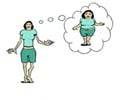Reward response and food intake control circuitry in the brain can be altered by eating disorder behaviors.

‘Reward response and food intake control circuitry in the brain can be altered by eating disorder behaviors such as binge-eating, which in turn, can again exaggerate this behavior. This may shed light for further research in the future development of treatments against these disorders.
’





"This work is significant because it links biological and behavioral factors that interact to adversely impact eating behaviors. It deepens our knowledge about the underlying biological causes of behavioral symptom presentation related to eating disorders and will give researchers and clinicians better information about how, when, and with whom to intervene," says Janani Prabhakar, Ph.D., of the Division of Translational Research at the National Institute of Mental Health, part of NIH. The study team analyzed 197 women with different eating disorders and varying body mass indexes (BMIs) associated with eating disorder behaviors, along with 120 women without eating disorders.
Brain Circuitry in Eating Disorders
Cross-sectional functional brain imaging was utilized to study the brain responses during a taste reward task where participants were either given or were denied an unexpected, salient sweet stimulus (a taste of a sugar solution).
The brain’s reward response known as "prediction error," (a dopamine-related signaling process that measures how surprised a person was receiving the unexpected stimulus ) was then analyzed along with its effect on food intake control system (ventral-striatal-hypothalamic circuitry).
Advertisement
"The study provides a model for how behavioral traits promote eating problems and changes in BMI, and how eating disorder behaviors, anxiety, mood, and brain neurobiology interact to reinforce the vicious cycle of eating disorders, making recovery very difficult," says Dr. Guido Frank, M.D., at the University of California San Diego.
Advertisement
Source-Medindia













